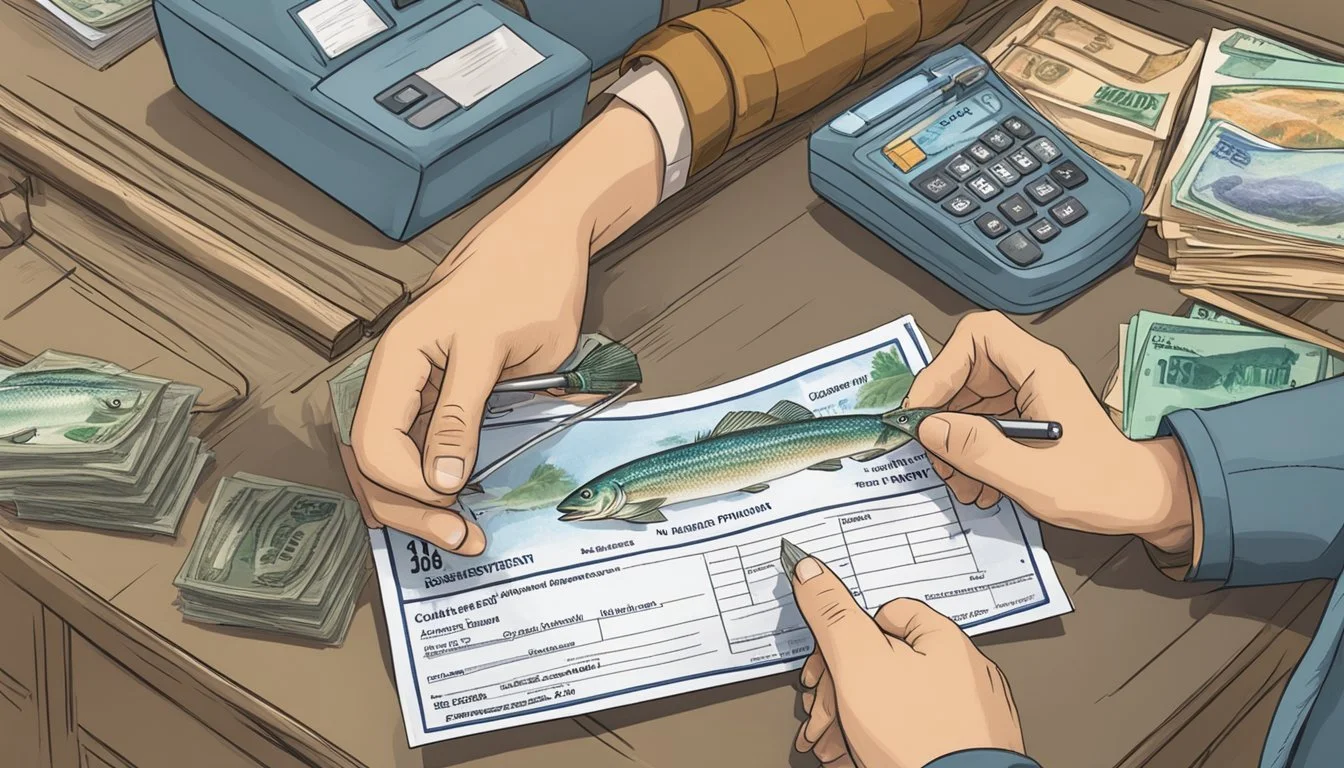How to Get a California Freshwater Fishing License
Your Step-by-Step Guide
Anglers looking to enjoy the rich waters of California, teeming with diverse fish (What wine goes well with fish?) species, need to acquire a freshwater fishing license to participate in the sport legally. The process is straightforward and can be done conveniently. For residents and non-residents alike, the opportunity to experience California's freshwater fishing is open, with various options tailored to the duration of the stay and the frequency of fishing trips.
The California Department of Fish and Wildlife (CDFW) oversees the regulation of fishing licenses, and these can be purchased online or at licensed agents and CDFW sales offices across the state. Resident fees differ from those for non-residents, and special provisions are provided for seniors, low-income individuals, and people with disabilities, ensuring that the pastime is accessible to a wide audience. Annual, one-day, and two-day licenses are available, while non-residents may also opt for a 10-day license, enabling visitors to indulge in sportfishing adventures throughout California's freshwater environments.
Before heading out to cast a line, it's essential for anglers to be aware of the local regulations, such as size and catch limits, to protect the delicate ecosystem and ensure sustainable fishing practices. With the right license in hand, fishers can explore the scenic lakes, rivers, and streams, pursuing species like trout, bass, and catfish, and contributing to the conservation efforts funded by their licensing fees.
Understanding California Fishing Licenses
To fish in California's freshwater environments, it's crucial for anglers to carry the appropriate license as a testament to their understanding and compliance with state regulations and conservation efforts.
License Types
California offers several types of fishing licenses to accommodate the diverse needs of anglers:
Annual License: Ideal for residents who fish frequently throughout the year.
Short-term Licenses: Available for one-day or multiple-day periods; suitable for tourists or occasional fishing trips.
Lifetime Fishing License: A one-time purchase that covers the angler for their lifetime, exempting them from future fee increases.
Free Sport Fishing License: Issued to eligible groups such as the blind, developmentally disabled, mobility impaired, and disabled veterans at no cost. Proof of eligibility is required for this license.
Eligibility and Residency Requirements
The California Department of Fish and Wildlife (CDFW) determines eligibility for fishing licenses based on residency status:
Resident: A person who has resided in California for six consecutive months immediately prior to the date of their application.
Non-Resident: Visitors from outside the state are also eligible for licenses, but often at a higher cost than for residents.
Youth: Anglers under the age of 16 do not require a license but may need a report card for certain species.
Age: There are no minimum age requirements to obtain a license, though regulations for minors apply.
Regulations and Conservation
Adherence to fishing regulations is mandatory for all anglers to support wildlife conservation:
Seasons: Fishing seasons are carefully defined to allow fish populations to replenish.
Bag and Size Limits: Limits are in place to ensure sustainable fisheries and healthy aquatic ecosystems.
Report Cards: Required for certain species to monitor populations and enforce quotas.
License Display: Licenses must be displayed upon request by a CDFW officer or an authorized agent.
Compliance with CDFW fishing regulations is essential to sustain California's aquatic resources for future generations of anglers.
How to Purchase a License
Purchasing a California freshwater fishing license is a simple process that can be completed through various channels including online platforms, authorized brick-and-mortar retailers, and directly from California Department of Fish and Wildlife (CDFW) sales offices. This process is essential for anglers to legally fish in state waters and contribute to the conservation efforts.
Where to Buy
A California freshwater fishing license can be bought at CDFW license sales offices as well as at recognized outdoor and sporting goods stores throughout the state. Retailers such as Walmart and Big 5 Sporting Goods, as well as local tackle shops, are authorized to sell fishing licenses.
Online License Sales
The most convenient method to purchase a license is via the CDFW's online licensing system. Prospective anglers can easily buy their license from the comfort of their home, any time of day. Purchasers can print their licenses immediately, making this a quick option for those eager to start fishing.
Authorized Sales Channels
In addition to CDFW license sales offices, numerous third-party agents are licensed to sell fishing licenses. These agents include:
Sporting goods stores
Outdoor retailers
Tackle shops
Always look for the CDFW authorized sales channel designation to ensure the purchase is official.
Purchasing In-Person
For those who prefer a physical transaction, licenses can be purchased in person at any CDFW license sales office or authorized retailer. When buying in-person, it is necessary to present proper identification and payment for the license fees. Some locations may offer the option to buy gift vouchers, which serve as a unique gift for any angler.
License Variations and Additional Validations
California offers a range of fishing licenses to suit different needs and requirements, along with validations and report cards for managing specific fisheries and collecting vital data.
Annual and Short-Term Licenses
California residents and nonresidents can obtain an Annual Fishing License, providing year-long fishing privileges in inland and ocean waters. Short-term options include One-Day and Two-Day Sport Fishing Licenses, ideal for tourists or occasional anglers who do not need an annual license. Licenses are available for purchase from license agents or online through the California Department of Fish and Wildlife (CDFW).
Free and Reduced-Fee Options
Reduced-Fee Sport Fishing Licenses are available for qualifying individuals, including seniors, veterans with disabilities, and low-income anglers. Free Fishing Days allow anyone to fish without a license, promoting the sport and encouraging new participants. On public piers, a sport fishing license is not needed, providing a cost-free option for saltwater anglers.
Report Cards and Validations
For certain species and areas, anglers must purchase report cards and validations. Report cards are mandatory for species like spiny lobster, Klamath River salmon in the Klamath-Trinity river system, and steelhead. The Ocean Enhancement Validation is required when fishing south of Point Arguello. Second-Rod Validations allow anglers to fish with two rods in inland waters where regulations permit it. Additionally, those fishing for crab (how long does crab last?) with traps must obtain a Recreational Crab Trap Validation. Special regulations such as barbless hooks or artificial lures may apply to specific areas to promote conservation. These additional requirements are in place to manage resources sustainably and are critical to protecting California's diverse aquatic species.
Special Fishing Opportunities and Regulations
California offers a variety of fishing opportunities and regulations tailored to promote both preservation and enjoyment of its marine life. From public piers to targeted programs, anglers must be aware of differing rules that apply to freshwater and saltwater fishing, as well as special days that allow for fishing without a license.
Public Pier Fishing
In California, fishing from a public pier does not require a sport fishing license. Public piers are a boon for anglers of all levels, providing a chance to fish for various species without a license. It's essential, however, for one to adhere to the specific regulations in place, which may vary by location and target species. These regulations help ensure sustainable fishing practices and protect marine ecosystems.
Inland vs. Saltwater Fishing
The distinction between inland and saltwater fishing is significant due to different ecosystems and species involved. Inland fishing typically refers to freshwater fishing in lakes, rivers, and streams, whereas saltwater fishing pertains to the ocean and bays. Special regulations may apply to certain areas, like the Smith Rivers, where specific rules are in place to protect local fish populations. Inland regulations also address concerns such as low-flow in rivers, which can trigger restrictions to conserve water and fish alike.
Inland (Freshwater) Fishing Saltwater Fishing Primarily in lakes and rivers In oceans and bays Affected by low-flow conditions Tides affect fishing May have specific trout regulations Includes fishing for abalone and other marine life
Special Programs and Days
The California Department of Fish and Wildlife (CDFW) has established special programs to encourage fishing and education about conservation. For instance, there are Free Fishing Days, typically two per year, when anyone can fish without a license, providing an excellent opportunity for novices to try fishing at no cost. Additionally, there are programs in place to offer reduced fee licenses to low-income seniors and other groups, making fishing more accessible to a broader demographic. These special days and programs are designed to foster a love for fishing while ensuring the protection and sustainability of California's aquatic resources.
Frequently Asked Questions
Navigating the steps to obtain a California freshwater fishing license generates a variety of common questions. Here, those inquiries are organized into categories concerning license options and fees, fishing regulations, and instructions for updating or replacing licenses.
Common License Queries
How much does a California fishing license cost?
California's fishing license fees vary based on several factors including the type of license and the buyer's residency status. For example:
A one-day sport fishing license for residents or non-residents costs $20.26.
Two-day sport fishing license fees are $31.06.
Lifetime fishing licenses are available at CDFW sales offices with fees differing by the age of the applicant.
Are there discounts available for state residents?
Discounts may be offered to residents for various fishing licenses. Seniors, disabled veterans, and low-income individuals often qualify for reduced fees. It is best to check with the California Department of Fish and Wildlife (CDFW) for current discounts.
What is required for non-residents to get a fishing license?
Non-residents must follow the same general process as residents to obtain a fishing license in California, though fees may vary.
Fishing Regulations
Do I need immediate possession of my fishing license while on the water?
Yes, anglers are required to carry their fishing license and any applicable report cards on their person while fishing. It must be presented to law enforcement upon request.
Can I fish without a license if I'm on a boat?
Regardless of whether you are fishing from a boat or the shore, you must have a valid fishing license if you are 16 years of age or older.
Are fishing report cards required for everyone?
Certain species and areas may require additional report cards, even for those under 16 or those fishing on free fishing days. Always check the current regulations to ensure compliance.
Updating and Replacing a License
What should I do if my license becomes discolored or damaged?
Licenses that are heat laminated or otherwise tampered with are considered void. If your license becomes discolored or is damaged, you should request a replacement from the CDFW.
How can I replace a lost fishing license?
To replace a lost fishing license, you will need to go to a CDFW sales office or an authorized agent, complete an affidavit, and pay the appropriate duplication fee.
Responsible Fishing Practices
Responsible fishing practices encompass both species conservation efforts and adherence to an ethical code of conduct while fishing. These measures help maintain healthy fish populations and ensure the sport's sustainability.
Species Conservation
Conservation of fish species is achieved through a combination of licensing regulations and bag limits. Each angler must possess the correct type of license for the specific fishing activity, such as a general freshwater license or special report cards for certain species like steelhead or sturgeon. Bag limits are set to prevent overfishing and are strictly enforced. For example, the California Department of Fish and Wildlife (CDFW) establishes specific quotas for different fish to manage the resources effectively.
Freshwater License: Necessary for the general public fishing in freshwater bodies.
Report Cards: Required for certain species and help track fishing efforts and success rates.
Adherence to these rules helps support species recovery and conservation initiatives, ensuring that fish populations thrive for future generations.
Fishing Ethics and Behavior
Anglers are expected to follow a code of behavior that respects the environment and other fishers. This includes:
Avoiding littering: Keeping waterways clean is crucial for the health of aquatic ecosystems.
Respecting other anglers: Fishing spots should be shared fairly, and noise should be kept to a minimum to avoid disturbing others and the fish.
Practicing catch and release: When appropriate, and especially with species that are under conservation, anglers should safely return fish to the water.
Abiding by fishing regulations: Including appropriate use of gear and fishing only during designated seasons.
By engaging in ethical fishing practices, anglers contribute positively to the sport and the environment.





